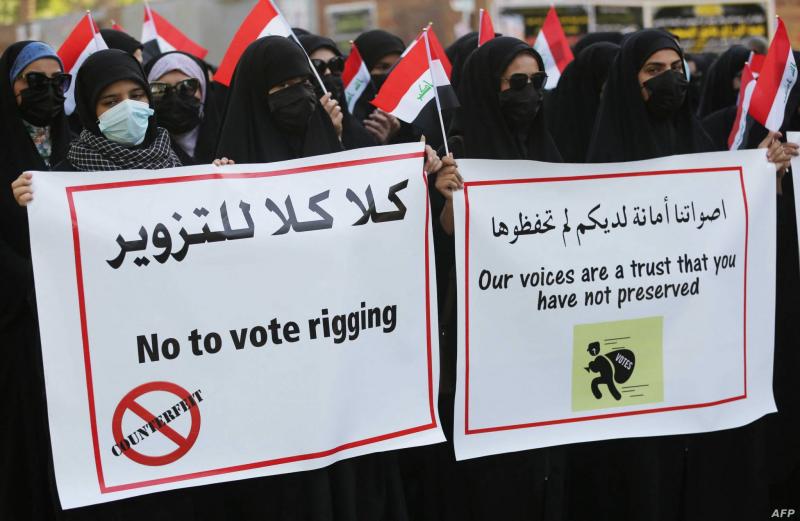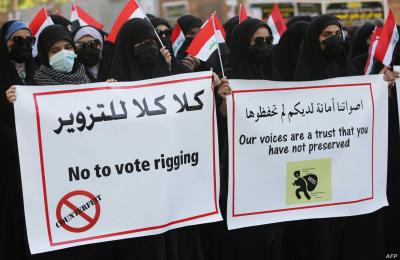Under the title "Iraq: Scenarios for the Reactions of the Election Losers and Exclusion of Religious Authority Intervention," the Alhurra website reported that about a month after the manual recount of disputed polling stations, the Iraqi election commission confirmed that the preliminary results would not change significantly. This raised questions regarding the acceptance of election outcomes by various factions in Iraq and whether the religious institution would play a role in this context.
Armed groups are skeptical of the results of the general elections held in October, where they faced a crushing defeat, leading to protests that escalated into violence in Baghdad this month. The manual recount produced changes related to five to six seats in the upcoming parliament, as confirmed by Imad Jamil, a member of the commission's media team, denying reports that suggested changes affecting up to 12 seats.
The preliminary election results showed that the Sadrist movement, led by Shiite cleric Muqtada al-Sadr, won first place, securing over seventy seats in the new parliament out of 329. The "Taqaddum" party, led by parliament speaker Mohammed al-Halbousi, came in second with 37 seats, ousting the Fatah Alliance, a strong ally of Iran, which was the second-largest force in the outgoing parliament with 48 seats but dropped to about 17 seats in this round. The State of Law bloc, led by former Prime Minister Nouri al-Maliki, ranked third with 34 seats, followed by the Kurdistan Democratic Party with 32 seats.
Political analyst Hashim al-Kindi stated that the losing forces would not accept these results "unless all procedures for manual vote counting and correction are completed." He noted that a review of only 5 percent of the votes led to changes in at least eight seats, questioning, "What will happen if the rest of the counting is reviewed?" He pointed out that the commission selectively dealt with complaints, accepting only 10 of them.
In light of this situation, al-Kindi believes that all legal scenarios are available to go to the courts. If this solution fails, he stated, "We can go to international courts," mentioning that a delegation from the Coordination Framework of Shiite forces is preparing to approach the Security Council to present evidence of election fraud. The final option is to reject the election results and boycott the political process, according to al-Kindi.
Ihsan al-Shammari, head of the Political Thinking Center, agrees that the losing forces will not accept the results "if they find themselves isolated from the upcoming political map and from the executive authority." He believes these forces are concerned about their absence from the government, given their previous control over the government of former Prime Minister Adil Abdul-Mahdi.
However, he added that the results could be accepted if there is "agreement within the Shiite political house" to grant them ministerial portfolios, immunity for their armed factions, and involve them in choosing the next president.
Al-Sadr called, in a speech on November 18, for Iran-affiliated armed factions to disband if they wanted to join his upcoming government and also demanded they hand over their weapons to the Popular Mobilization Forces, which are affiliated with the government, through the commander-in-chief of the armed forces.
With the election commission announcing on Thursday the completion of manual counting and sorting, final results are expected to reach the Federal Court within ten days at most. In this context, Sadrist member Essam Hussein predicts that the losing forces will reluctantly accept the results "despite their insistence on them being fraudulent," especially after the Federal Court certifies them.
Hussein attributed the losing forces' rejection of the results to their attempts to "pressure the Independent High Commission," asserting that the losers will hold onto this position as long as the results are not certified.
In the past two weeks, clashes occurred between protesters associated with armed factions and security forces when they attempted to breach the Green Zone, where government headquarters and foreign embassies, including the U.S. embassy, are located. For the first time in four months, four Katyusha rockets fell near the Green Zone on Sunday, according to a report from the French press agency citing an Iraqi security source. Also, Prime Minister Mustafa al-Kadhimi survived a failed assassination attempt with an explosive drone targeting his residence in Baghdad, in an attack that no group has claimed responsibility for.
However, a Sadrist member affirmed to Alhurra that these forces lack the tools to disrupt the election results, stating, "If they consider using threats or force, they will lose much of their political capital." He added, "The conflict among the losing forces regarding these results is about political survival and retaining influence within the government and parliament."
Al-Shammari agrees with this view, excluding a full-blown confrontation. He indicated that these forces may resort to boycott and political opposition and create problems for the government.
Regarding the possibility of the religious authority in Najaf intervening to resolve disputes among Shiite forces, Sheikh Majid al-Aqabi, head of the Center for Thought, Dialogue, and Reform, told Alhurra that "the religious authority issues some guidelines as recommendations and not as orders or direct intervention in the political process."
In November 2019, Grand Ayatollah Ali al-Sistani (91 years old) notably supported the angry protests that called for "the resignation of the government" and a change in the political class that has governed Iraq for 16 years, accusing it of corruption and wasting the country's wealth. However, al-Aqabi emphasizes that the religious authority has not intervened directly in the political process in the past and will not do so in the present or future, indicating that it only sends guidance.
Earlier this month, the authority rejected the inclusion of al-Sistani's name in any meetings or discussions regarding government formation. Al-Kindi states that the authority does not intervene "in these detailed matters," but added, "If the religious authority were convinced of the election results, it would have blessed and supported them," noting that its silence is evidence of its dissatisfaction with the commission's performance.
In this regard, al-Shammari does not believe that the religious authority will intervene in the crisis among Shiite forces, adding, "The Shiite reference wants to distance itself from intervening in this dispute." A Sadrist member also excluded the religious authority's role in the political scene in the upcoming phase, attributing this to its belief in democracy and its political outcomes and some political blocs' ability to stabilize the situation. He noted that the religious authority will adopt a neutral position.




